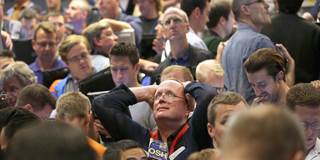
Blame the Economists?
Ever since the 2008 financial crash and subsequent recession, economists have been pilloried for failing to foresee the crisis, and for not convincing policymakers of what needed to be done to address it. But the upheavals of the past decade were more a product of historical contingency than technocratic failure.
BERKELEY – Now that we are witnessing what looks like the historic decline of the West, it is worth asking what role economists might have played in the disasters of the past decade.